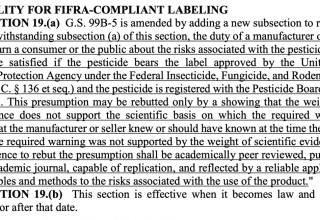The North Carolina Senate approved the 2025 Farm Act on June 17 by a 31-14 vote, despite controversial provisions such as labeling of pesticides and banning the sale of raw milk.
Before the floor vote, key amendments were adopted that target crop-theft penalties, utility-line safety studies, and wastewater-management practices.
SB 639 initiates studies on raw milk herd-share systems and bans labeling raw milk as “pet milk” or what lawmakers dubbed the “milk loophole.” The sale of raw milk for human consumption is illegal in North Carolina; labeling it as “pet milk” or not for human consumption is a common workaround often utilized to sell raw milk legally. There is a provision in the farm bill that would close the “milk loophole.”
Those in opposition to legalizing the sale of raw milk for personal use cite health concerns, including viruses associated with raw milk, including Highly Pathogenic Avian Influenza (HPAI).
The North Carolina Department of Agriculture & Consumer Services (NCDA&CS) opposes the sale of raw milk, citing health concerns and food safety. Supporters of repealing the ban on raw milk for personal use argue that raw meat and bagged lettuce can also be sources of bacteria if not prepared or appropriately consumed. John Locke Foundation CEO Donald Bryson argued in a recent CJ editorial that those who want to purchase raw milk should receive similar freedom.
Another point of contention in the bill is Section 19, which allows for pesticide manufacturers to be protected from liability as long as their product has a label approved by the US Environmental Protection Agency (EPA) under the Federal Insecticide, Fungicide, and Rodenticide Act (FIFRA).
This stems from a pending Supreme Court case in which Monsanto, a subsidiary of Bayer, is being sued for failing to warn consumers that Roundup contains glyphosate, which can cause cancer. However, under FIFRA, pesticide companies cannot change warning labels on products without EPA approval first.
“If you respect crop protection tools, the rule of law, and an efficient food system, there’s only one right answer here,” said Ray Starling, general counsel for NC Chamber, in his analysis. “Nobody calls their lawyer when they’re hungry.”
The NC Chamber supports Section 19, arguing that the clause protects the food supply, manufacturers, and families.
“Without this provision, North Carolina is opening a pathway for companies to be targeted by plaintiffs’ attorneys for simply complying with federal law. The rigor of EPA requirements cannot be overstated, attempts to add a state-level of regulation to that process will increase lawsuits and bigger pockets for plaintiffs’ attorneys, but it will not do anything for farmer safety.”
Experts argue that such protections for industry leaders undermine free market checks and balances and consumers’ impact on market winners and losers.
“This to me is an alarming example of corporate lobbying skewing policy in favor of industry giants,” Kelly Lester, policy analyst for the Center for Food, Power and Life at the John Locke Foundation, told the Carolina Journal. “By shielding these companies from accountability, the state disrupts the natural checks and balances of a free market, where consumers and courts should help determine winners and losers based on merit, safety, and responsibility. Such carve-outs undermine both public trust and the principles of fair competition.”
After passing in the Senate, SB 639 was sent to the House by special message. On June 18, it passed the first reading and was sent to the House Rules Committee.
The post Senate Passes NC Farm Act first appeared on Carolina Journal.
The post Senate Passes NC Farm Act appeared first on First In Freedom Daily.
Click this link for the original source of this article.
Author: Katherine Zehnder
This content is courtesy of, and owned and copyrighted by, https://firstinfreedomdaily.com and its author. This content is made available by use of the public RSS feed offered by the host site and is used for educational purposes only. If you are the author or represent the host site and would like this content removed now and in the future, please contact USSANews.com using the email address in the Contact page found in the website menu.








